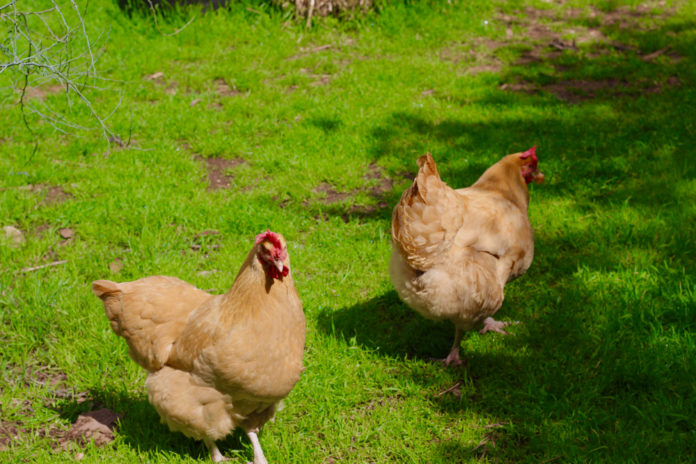
April 23, 2018, 10 hens of the 11-hen brood shuffled restlessly in their coop in the Food, Energy and Sustainability Team (FEAST) Garden at Occidental College. FEAST workers found the eleventh member, a Rhode Island Red named Cheeky, sick and unmoving. Cheeky suffered from egg binding, a serious condition in which the egg was stuck in her oviduct, meaning she was unable to pass it. When this happens, the egg is at risk of breaking inside of the hen’s oviduct. Cheeky was in severe discomfort and pain.
Diego Zapata (senior), director of FEAST, adored Cheeky. She had little cheeks, which gave the impression that she smiled all the time. Zapata said she followed him around the garden when he was there; she was like a little pet to him, a companion. He talked to her about everything.
“I told her all my dirty details and all the tea,” Zapata said. “She never judged me and you cannot find that in most people.”
Zapata and Aria Devlin (sophomore), FEAST compost manager, decided the most humane action to take was to put Cheeky down.
Devlin held Cheeky’s body, while Cheeky’s neck rested between two nails hammered into a board. Then Zapata swung a machete he borrowed from Facilities. Blood sprayed. After the initial decapitation, Devlin said she struggled with the body, as the wings fluttered with a significant force. Chickens’ neural networks in their spinal cords are pre-programmed to direct muscles in various frequently-used patterns of movement. For this reason, chickens are able to run around post-beheading for a few seconds.
Devlin and Zapata both shed tears, said some words in honor of Cheeky’s life and buried her. They were both devastated.
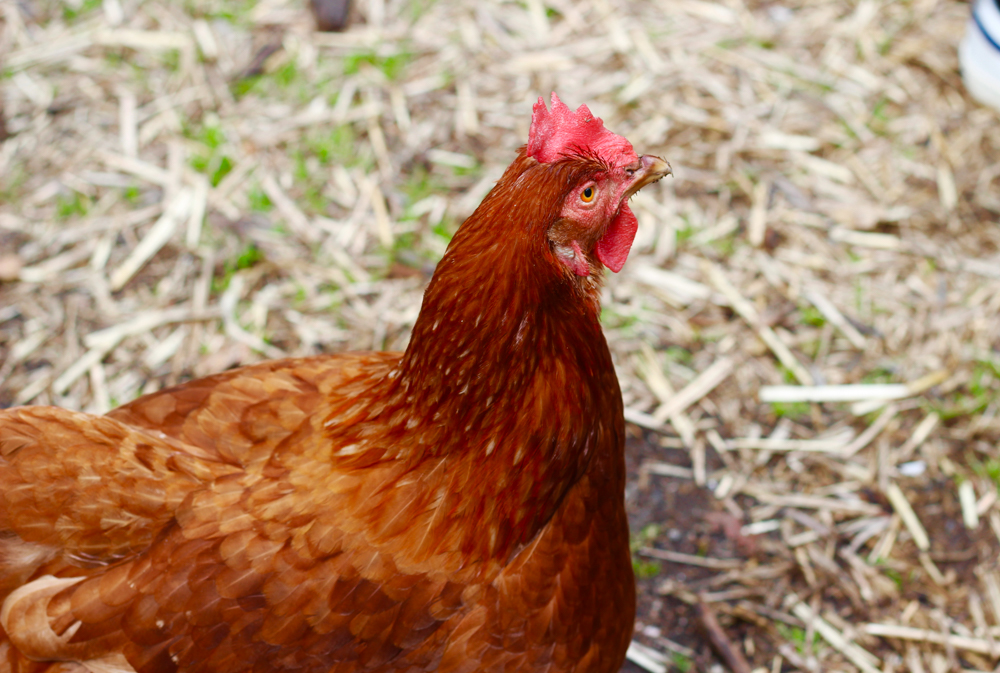
“I think I realized how much I kind of ignored them and the meaning of their actual life and I think it really did change the way that I see meat and chicken, specifically, especially because it is all around me,” Devlin said. “I’d never really contemplated the process of how it is a happy, live chicken in the garden to on my dinner plate.”
The decision to cull Cheeky did not come easily to Zapata. FEAST is a student service, and as such, they are expected to serve the student body and reflect what they want.
“There are times when we have to cull a chicken just because it’s the best thing to do,” Zapata said. “And there’s definitely moments in that decision-making process over, ‘How do we navigate this? How do we tell this to all the volunteers who know this chicken? How do we make sure we do this in a humane way?’ It’s very hard for us to navigate.”
The FEAST staff is divided on how to appropriately handle this challenge — some believe they should embrace it as part of the farm-making process and a necessary step of the life cycle. At the same time, positive public relations is an essential function of FEAST’s success.
“I don’t want FEAST to be shunned as an animal-cruelty chicken-murderer organization when that’s not what we do,” Zapata said. “We do our best to give these chickens the best conditions that they can have. They free range all the time — most chickens don’t even see the light of day.”
As chicken lives go, the FEAST chickens are spoiled, according to Zapata.
“The chickens have a storied past and a storied future,” Zapata said.
Three years ago, former FEAST president Skye Harnsberger ’17 bought a set of eggs and an incubator. Zapata said she wanted to expand the brood of hens because they are a cornerstone of the garden, a major talking point and a draw for student and community volunteers. The chicks required a meticulous schedule but received frequent attention and handling by students.
“Students got the opportunity to see the whole process from egg, to pullet, to chicken,” Zapata said.
Now, three times a day, every day of the week, Occidental chicken volunteers trek to the FEAST garden to check up on the chickens, ensure they have food and water and let them out.
“A lot of our chicken volunteers just come here to interact with another living being and to take care of it and to take responsibility of, and ownership of an animal’s well-being — it empowers you. And it’s also meditative … It gives us a purpose,” Zapata said.
Zapata wants more students to know the FEAST Garden is their space and the resident chickens are their chickens; students should capitalize on the opportunity to learn from them and help them thrive. Last year, FEAST members put a chicken in a pink harness and a leash and brought the chicken down to the Academic Quad during lunch to remind Occidental’s student body of its beloved feathered flock. Devlin said students loved it.
“That day the chicken was just on the quad as a student. Just like another one of the Oxy dogs,” Devlin said.
This was not the first adventure for a FEAST hen. This past summer, someone cut the wire of the quarantine coop — an adjacent, smaller coop for chickens who are ill and risk getting others sick — and stole a chicken named Cleo. The thief remains at large and Cleo remains missing.
Four or five years ago, before Zapata was FEAST director, four chickens randomly disappeared from the coop. No one knew what happened, and FEAST members assumed they were gone forever. According to Zapata, two weeks or so later, someone found a dog kennel on the field in Jack Kemp Stadium. Inside: the four missing hens. A group of Eagle Rock high schoolers had stolen and then returned the chickens for their senior prank. The only casualty: some ruffled feathers.
Due to the sheer number of caretakers, there are discrepancies in the names of each of the chickens. FEAST Garden Manager Karl Kelly (sophomore) and FEAST Student Engagement Coordinator Celeste Padula (junior) refer to the one Ameraucana chicken, a breed that lays blue eggs, as Kraken. Kraken’s original name is “Cluck.” Devlin named all the chickens after body parts, so she calls Kraken, “Armpit,” and others Elbow and Butt Crack.
Padula claims she spends the most time with the chickens. She can tell the chickens apart by their combs — the red skin that sticks upright on their heads. Goldie, for example, has a shorter comb because she is at the bottom of the FEAST hen pecking order, according to Zapata, Devlin, Padula and Kelly. The pecking order is the natural social hierarchy the hens organize themselves into; the strongest hen bullies her way to the top. The pecking order influences feeding, drinking, egg laying, dust bathing and mating (if FEAST had roosters). Other hens peck at Goldie’s comb during these activities. Padula and Kelly said the hen named Regina George is at the top of the pecking order. As in Regina George from “Mean Girls.”
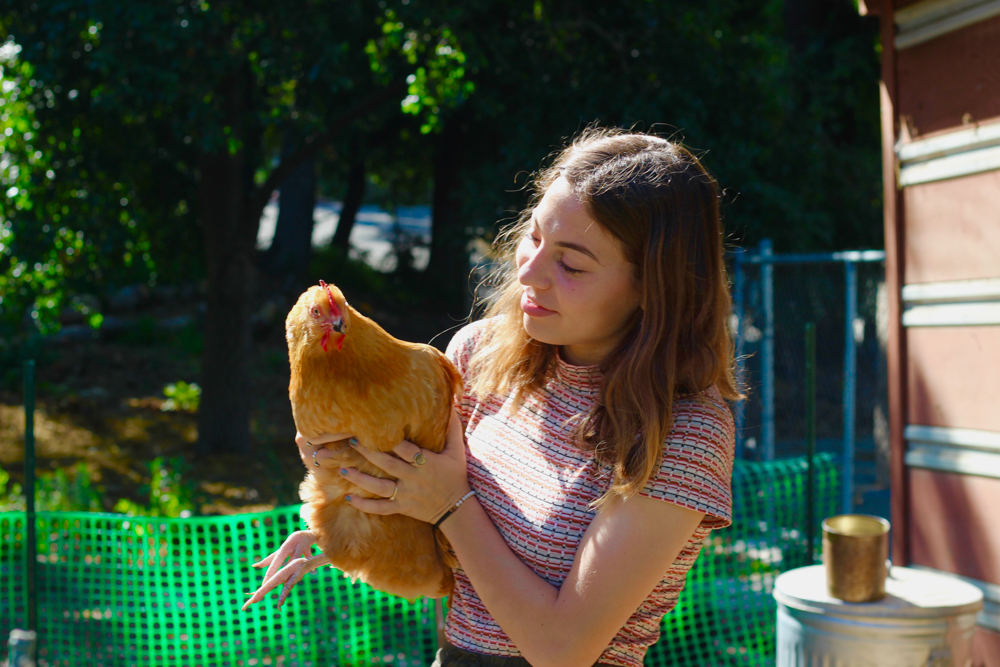
Padula had chickens at home in Atlanta, so when she got to Occidental, one of the first things she wanted to do was help take care of the ones at FEAST. She spends much of her free time with them, even outside of work. She has brought friends to the garden who have never seen a chicken before. If the hens are lucky, Padula brings them treats from the Marketplace like salad and fresh fruit. They get excited when she does this.
“They recharge me, especially after a long day — I just want to come back here and hang out with them for an hour,” Padula said.
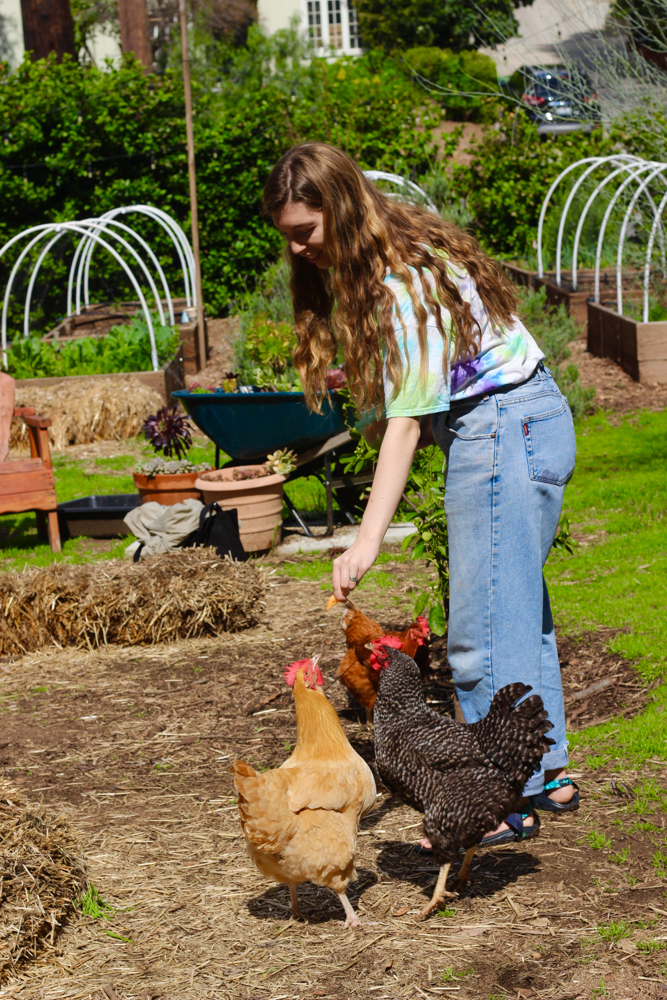
Kelly supervises the chickens during his shifts working in the garden. He says he talks to them in the same way he talks to his dogs at home. Devlin treats them like her therapist. Like Zapata, she shares her life frustrations with them and they listen. She said she finds loyalty and love in them she has not found elsewhere.
“They don’t even criticize me … they’re old hens. They’re just wise and their silence says so much,” Devlin said. “I actually feel really good [after] because sometimes when you bare your soul to someone, it can feel a little bit like they know everything about you and who knows what judgments or what they’re going to do with that information. The chickens — I kind of know that they’re keeping my secrets safe.”
The chickens often attract local community members to the garden. Eagle Rock resident Andy Baker stumbled across the FEAST Garden when he moved here around six years ago. Baker grew up around farm animals, so when he noticed the few chickens that were around back then that had been abandoned during summer breaks, he took it upon himself to feed them every day. When it happened again the following summer, Baker said he brought a cut-off wheel and an angle grinder and cut the locks off everything so he could feed the chickens. He bought feeders and water and hundreds of pounds of food over the course of that summer.
“I was just the chicken guy from then on out just by virtue of picking up the slack,” Baker said.
The slack has lessened as FEAST leadership and the volunteer team have become more organized. Baker has been bringing his two daughters up to the garden to hang out with the chickens since they were born. Helena, his 5-year-old daughter, said her favorite chicken is one of the black ones because she has known it since she was 3.
“I like to come up here now because of this,” Baker said.
He motioned to his daughters, who ran around the FEAST garden, giggling and shrieking. They chased the chickens and convinced the chickens to chase them by luring them with greens. His 2-year-old daughter Vivienne wore a pink jacket with a chicken comb sewn on top of the hood and bird wings sewn to the arms. A mock chicken wattle, the red skin that dangles from a chicken beak, was sewn near the neck. It was an old Halloween costume Baker made for Helena when she wanted to dress up as a baby chick. Now Vivienne wears it for days at a time.
Sociology professor John Lang said it is important students and children interact with food sources, especially in the context of the American food system, where individuals are vastly disconnected from the processes and labor that goes into creating the food on their plates. The presence of the FEAST chickens demystifies where food comes from and helps individuals understand the biological processes that go into making food and the caretaking aspect necessitated for animals.
“We are truly divorced by great distances from the production of animals for food,” Lang said. “It takes away this essential nature from that process, which really makes it easier for us to consume meat and think of it as meat rather than a living being at one point or another.”
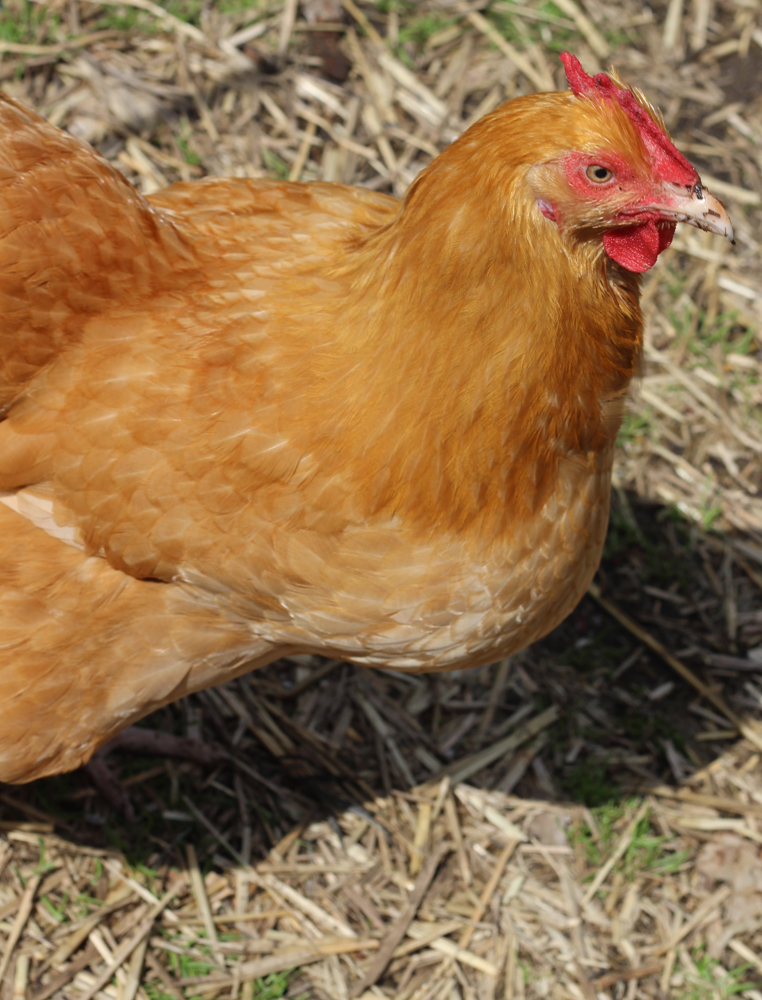
Zapata views the role of the FEAST Garden and the chickens as bringing people closer to the steps in the food processes they are otherwise disconnected from. He hopes this experiential learning will create a butterfly effect in promoting sustainability.
“I feel like a lot of people, when they think about chicken-raising and gardening and other forms of agriculture, they think that it has to be elsewhere, it has to be in a rural area, or there’s a barrier in terms of access to information or just fear,” Zapata said. “And for … anyone who visits the garden, for them to see chickens being successfully raised so close to a residential area, or even just on a campus, it’s kind of hard for people to wrap their minds around that. It empowers them to consider growing their own food at home.”
Lang thinks engaging with farm animals will prompt people to examine their own eating habits and the food system they participate in. Devlin echoed this, emphasizing the necessity of considering every step of the food source’s life cycle, including death.
“I think that regardless of your eating lifestyle, you should be comfortable being around and I would even go so far to say, if you do eat meat, you should be comfortable slaughtering the animal you eat,” Devlin said. “I think it’s important that people come and see these animals — these lives we’re sustaining.”
The chickens provide Baker’s children, Helena and Vivienne, an experiential education that will likely extend beyond the wood-picketed fence of the FEAST Garden.
“They’re learning. We’re learning where the eggs come from … we know where a lot of our food comes from,” Baker said. “They know what it takes: it takes water, it takes effort, it takes the soil, it takes doing to sort of get this. And to be able to teach them that is a fantastic lesson.”
It is a lesson in life, in sustenance and ultimately, a lesson in death. April 3, a volunteer discovered one of the Rhode Island Reds dead in the coop.
“These chickens — there is only 10 [nine by the date this article published] of them. But they’ve touched so many people in ways that they can’t even comprehend,” Zapata said. “They have taught people what it means to be a good chicken caretaker, a good human and just really consider sustainability and ethics in everyday life choices.”
![]()



































